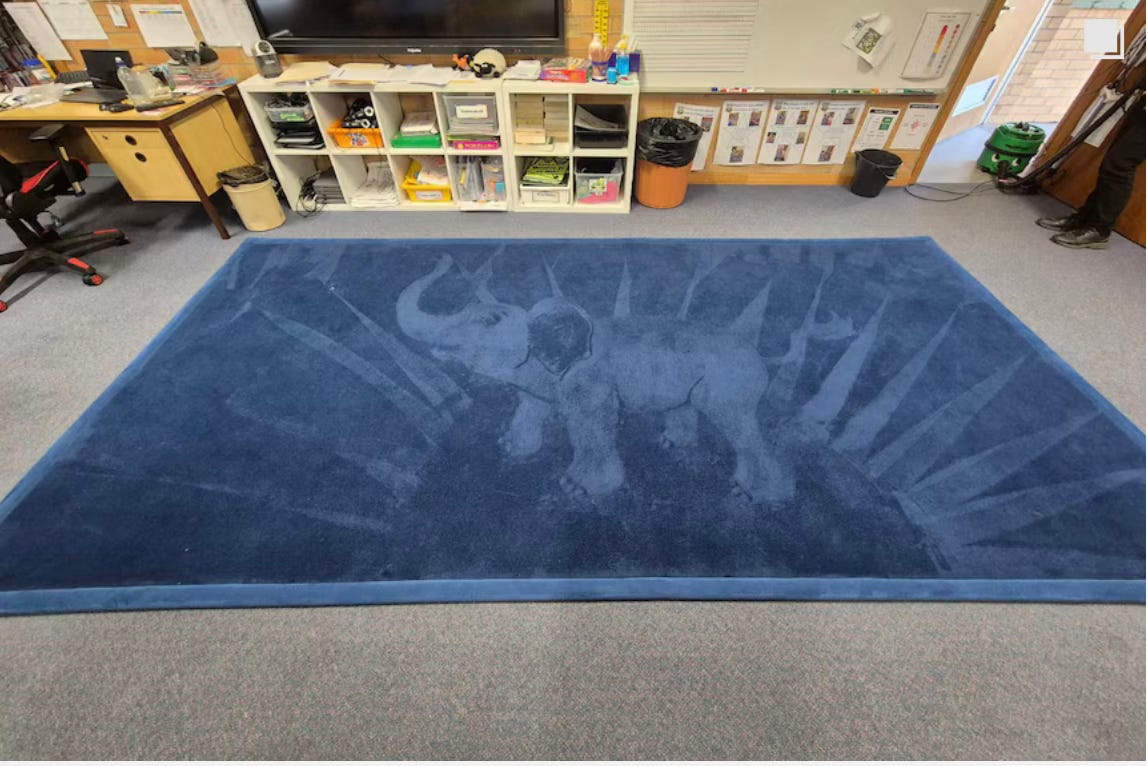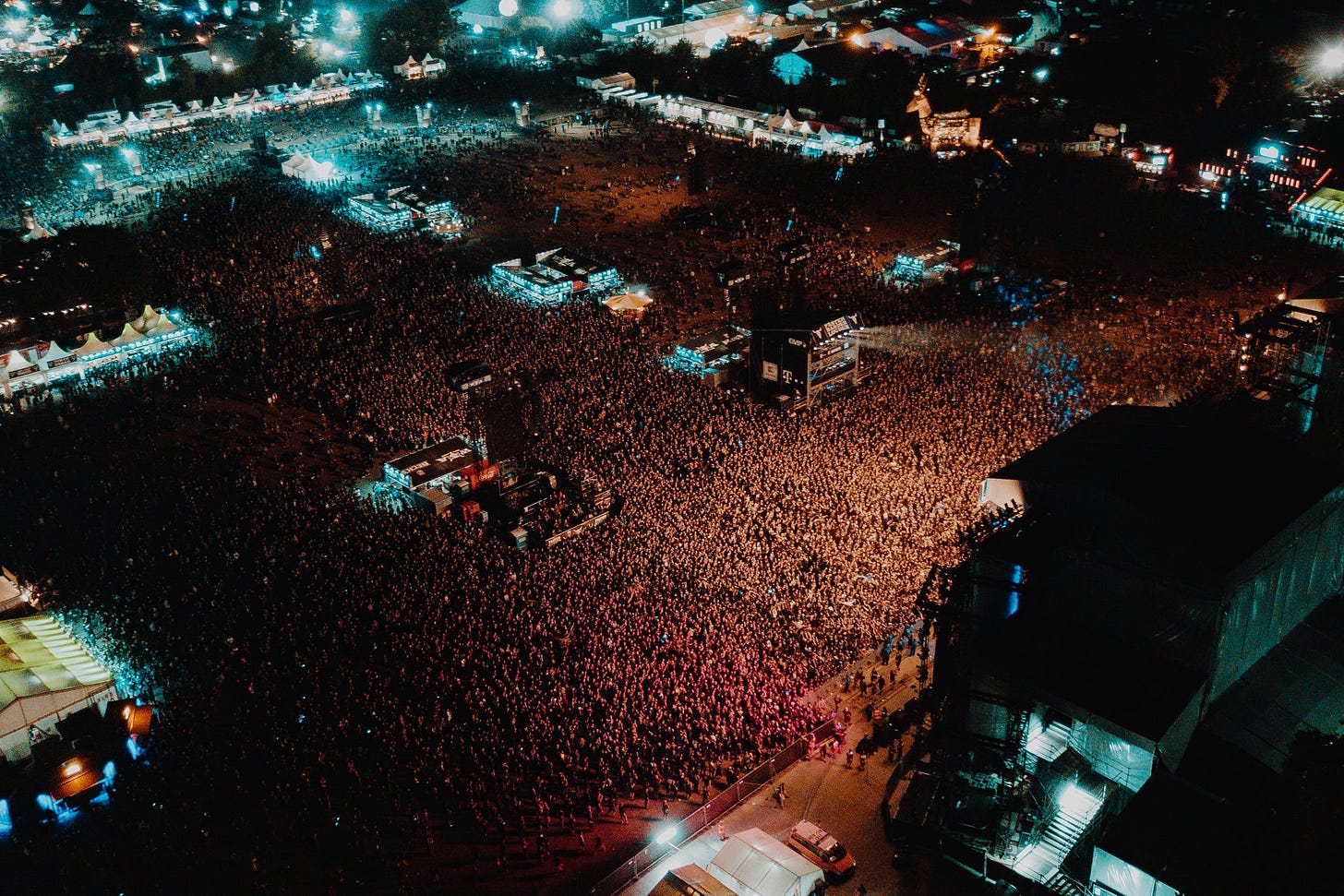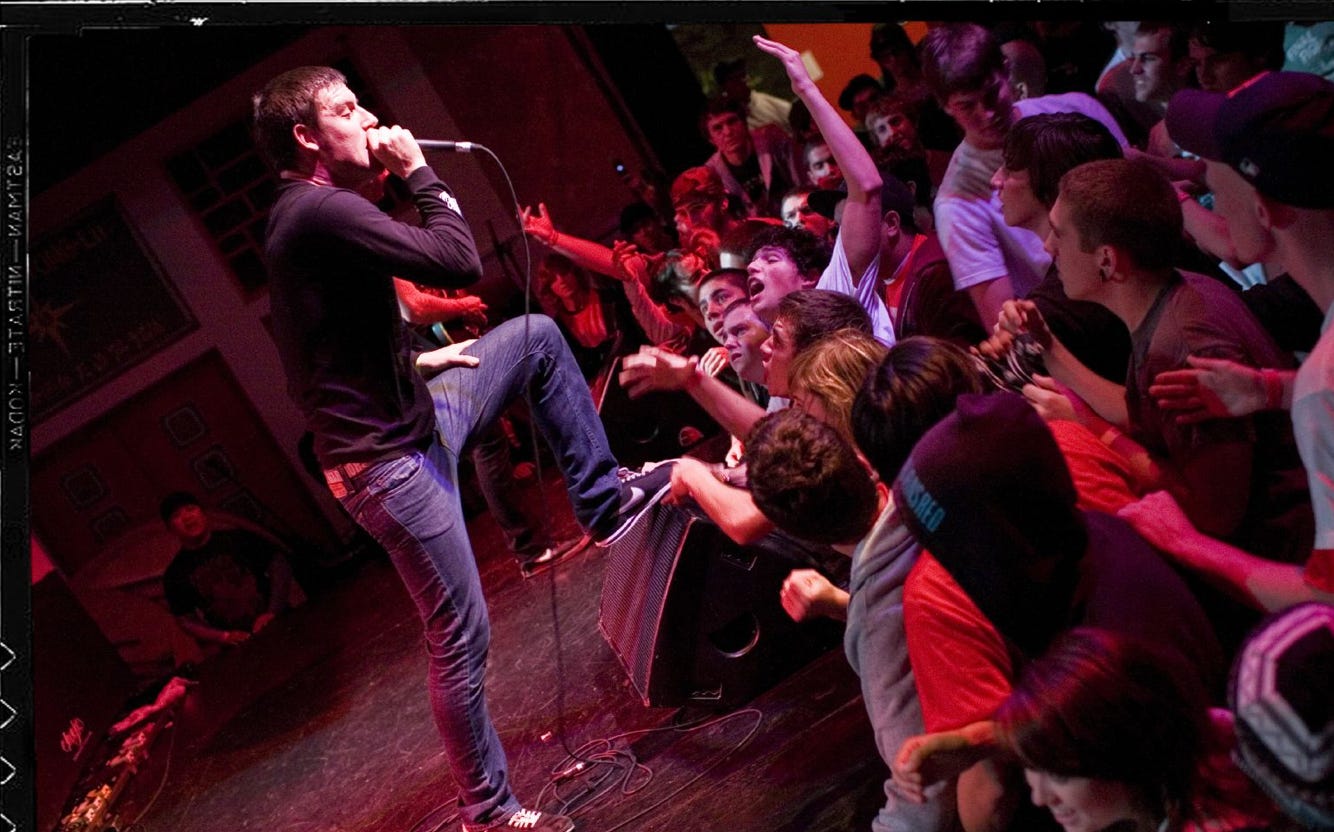The Missive #73
Home as a place of production. Chappell Roan isn't the problem. My biennial Parkway Drive essay.
Links and recommendations
I’ve spent the last five years working from home, two of those in Melbourne’s rolling lockdowns and three from Newcastle. My career has absolutely flourished and I truly hope I never have to work in an open-plan office five days a week ever again, but it has changed how I feel about “home” as a concept.
This piece from Karen Rosen really resonated with me. Maybe our homes should be a place of production and community rather than womb replacements? After all, that’s what they all were before the industrial revolution.
“I believe we’re placing way too much emphasis on comfort. And don’t get me started on convenience. A service that offers people to deliver a single avocado to their doorstep in less than 10 minutes simply should not exist. Where is this all headed? Are we never going to leave the house again? Never interact with other humans again? It’s not like increasing levels of comfort and convenience is making us happier or healthier … My vision of a truly smart home is one where some sort of knowledge work is done to generate part of the income, in tandem with some food production and preservation. It is a place for a multitude of activities, a place where we can acquire practical skills like gardening, woodworking or sewing. This home of the future is one of reduced complexity, a place filled with fewer things, but things we know how to care for and repair.”

“I feel ambitious about making this sustainable,” she says. “That’s my biggest goal right now. My brain is like: quit right now, take next year off.” Her mouth forms a small, tense line again. “This industry and artistry fucking thrive on mental illness, burnout, overworking yourself, overextending yourself, not sleeping. You get bigger the more unhealthy you are. Isn’t that so fucked up?”
“At a certain point, all those being harshly critical of Roan have to ask themselves: What do you even want from her? To be clear-eyed about her civic duty as a famous person? She’s already done it. If the public is seeking their moral and ethical cues on who to vote for—or the value of voting in the first place—from a 26-year-old who makes perfectly good songs about finger-blasting some girl in your used Pontiac in Missouri, well, consider that a further sign of just how far we have strayed from God’s light.”
Scaachi Soul - “Chappell Roan is not the problem. You’re not going to like what is.”
“I’ve been on the internet for twenty years: I’ve been on fanfiction.net, I’ve been on Livejournal, I’ve been on Tumblr. I was surrounded by people who spent time alone, but they were creating. They were writing, they were generating, they were knitting and sewing and painting and dreaming. The specific activity I’m talking about is a lack of any of this. The people screaming from their rooftops about how they don’t go anywhere and don’t have any friends aren’t the same people writing 70,000 words of Harry/Draco smut, I’m sorry! I know my people, and this feels different. It feels more sinister. Posting fanfiction online is a bid for community. Scrolling on your phone is not.” - The Mainstreaming of Loserdom
Listening
This 90 minute long episode of “You’re Wrong About” focusing on “Rumours” by Fleetwood Mac. The hosts were wrong about Christine McVie and Stevie Nicks relationship with each other, but it was still a good listen.
I loved Abbie Chatfield’s recent interviews with Amy from Amyl and the Sniffers & Missy Higgins. Her fandom and enthusiasm make them so fun to listen to.
I know it’s uncool and problematic, but I’m loving Linkin Park’s comeback, seven years after Chester Bennington’s tragic death. The music sounds like it could have come out 20 years ago, and in the live stream, the remaining band members look like they’re having so much fun. I think it’s cool that founding guitarist Brad Delson is still part of the band but has chosen not to tour for his own wellbeing. Props to new singer Emily Armstrong for taking on the hardest gig in rock.
Watching
Iconic drag queens Trixie Mattell and Katya watch Kath & Kim for the first time. “Why is this the best thing on Netflix? I’m so glad we got to see this so that other people can discover it.”
Reading
The Lowest Most Awful substack
Miranda July - “All Fours”, where the protagonist kicks off her own peri-menopausal sexual revolution.
Amanda Montell - “Cultish - the language of fanaticism”. This was a great way for me to realize I’m a sucker for a cult.
Kate Conger and Ryan Mac - “Character Limit”. A forensic and detailed examination of the downfall of Twitter, even before Elon Musk took it over. God, I miss 2007-2013 era Twitter.
My biennial Parkway Drive essay: on ambition and tall poppy syndrome
A couple of weeks ago, my wife and I met up with K and L (two of my oldest friends) to see Parkway Drive play their biggest-ever show as part of their 20th anniversary tour. Parkway Drive are my Taylor Swift, and this 20th anniversary show was their equivalent of the Eras tour.
Parkway Drive are often described as “the biggest Aussie band you’ve never heard of”. They formed back in 2003 as a group of teenage surfers from the small town of Byron Bay, and they played the fastest and heaviest metal they could so their mates could mosh to it. The music they made back then didn’t get radio play or mainstream media coverage, so they made their mark by relentless international touring, high-energy live shows and building strong fan connections. It also helped that they stood out, visually: they were surfer bums in board shorts and t-shirts in an era of swoopy dyed-black fringes and skinny jeans.
They’re the band nobody saw coming, and certainly nobody thought would succeed. And yet, after 20 years they’re the biggest they’ve ever been. This 20th anniversary tour sold nearly 100,000 tickets in arenas around the country. They’re renowned and sought-after headliners for the biggest heavy rock festivals in the world. They still don’t get radio play, they’re still a self-managed and self-funded band and have never been on a major record label.
As part of that relentless touring, back in the early days they played every coastal PCYC, youth center and school hall in Australia they could find. This is how they built their following, and most Aussie millennials who grew up in a regional area and liked alternative music would have attended a Parkway show at some point. My wife, K and L had all seen Parkway for the first time when they were in high school. K & L grew up in Byron shire, so they were lucky enough to see some of Parkway’s early shows at the local youth centre and high school auditorium.
I first saw them at a club in Brisbane when I was 18. It was the most aggressive music I’d ever heard, and I feared for my life as a crowd of 200 people beat the shit out of each other. The energy of it all changed my life, and I’ve been a Parkway stan ever since.
All four of us had travelled a couple of hours to get to Sydney, with K & L dropping their kids off for a sleepover with their beloved grandfather. We had a nice dinner together, then hung out at the Amex Lounge at the venue, snacking on a cheese board1. It felt a very long way away from the Parkway Drive shows of our youth, where food was nowhere to be found and the beverages on offer were $2 cans of soft drink or illegally consumed alcohol. We took our seats in the alcohol-free section, surrounded by middle-aged straight edgers and people with their kids.
To say this show was next level is an understatement. It was transcendent. They knew riffs and singalongs aren’t enough to keep a crowd of 15,000 people entertained for two hours, so they went all out with incredible production and a narrative. They had songs from their entire discography. They had dancers, an indoor rain storm, costume changes, a floating platform/bridge that shot fireworks and flames from the side and brought a string trio down from the ceiling. Then the string trio danced and traded solos with the lead guitarist. Their drummer spun 360 degrees in a metal cage, ripping a solo the whole time. They brought their mate2 who saw their first-ever gig and helped start their career onstage mid-song through a trapdoor in the stage. They played a 10-minute-long medley of all the intros, breakdowns and guitar solos from their debut album as a thank you to the old heads. They had obscene amounts of pyro.
Between all of us, we’d seen their shows go from this:
To this:
To this:
We walked out of there feeling so proud of five guys who we had zero personal connection to.
The most meaningful parts for me were the beginning and the end. This wild two-hour-long visual spectacle began with the band walking through the crowd to a smaller, secondary stage, high-fiving and embracing fans as they went. It was a meaningful nod to the early days, where their shows were so small that there wasn’t a barrier or a stage to separate the band from the crowd. They opened and closed their set on this tiny stage with their signature songs from earlier in their career — a gesture that said “we don’t forget where we came from, but we want to show you where we went.”
Australia’s natural culture of tall poppy syndrome discourages dreaming, striving, imagination and creativity. It jeers, “Who do you think you are? You think you’re better than us?”. From day one, Parkway Drive have been an ambitious band in a country and in a culture that actively discourages it. They came from a place with no scene, no music industry and honestly, not even any employment opportunities for regular jobs.
They loved playing to their mates in their drummer’s basement but they had dreams of bigger shows: so they created a venue at their local youth center because they were too young (and their music too inappropriate) for pubs. The youth center shows went well, but they had bigger dreams: so they hit the road in a shitty van and played PCYCs around the country. They loved playing to thousands of kids in Australia but they had bigger dreams, so they chased it overseas. They loved playing during the day on big festivals but they had bigger dreams to headline - so they chased it by changing up their sound and learning how to put on big productions. They’ve also demonstrated the power and opportunity in softening up, both musically (their songs have melodies now) and personally (they went to group therapy and spoke widely about how toxic masculinity nearly broke up the band).
We’re in a world where people in power are very happy to see us glued to screens and separated from each other. We need wild, creative ambition and transcendent live cultural experiences more than ever, and I feel lucky I’ve got to follow the same band doing it for my whole adult life. Viva the underdogs!
Hilariously listed on the menu as “The Cheese Experience”
I didn’t have mid-00s hardcore royalty Michael Crafter coming up through the floor on my bingo card for this show, but it was such a nice gesture.







